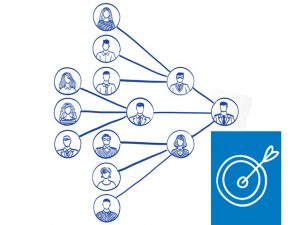Referrals are a great way to grow an advice business because they allow an adviser to meet new clients without having to cold-call or beat around the bush to find them. Yet not every request for a referral results in a new client.
In this article, SRS Coaching and Consulting’s Rachel Staggs, suggests that instead of just asking for a referral, advisers should be specific and orchestrated in who they can help, leading existing clients to refer those type of people to their adviser when the time or need arises.
Every month, I get the opportunity to talk to clients of financial advisers through the client research I complete. I always find it an honour to speak with clients, but one of the greatest outcomes is that I get to really understand how they think and why they make the decisions they do.
Every time I speak with clients, I ask them whether they have introduced or would introduce others to their financial advisers. Nine times out of ten, the client will say, “Oh yes, of course, I already have.” But did they just mention your name in passing? This small but critical step could be costing you new client introductions.
When was the last time you introduced someone to another business? I’m talking about your social circles. This is a great question to ask your team too. Why? Because it will give you a clear understanding of whether people do or do not talk about other businesses. If they say ‘Yes’, ask them to explain the situation. What made them remember the company they were referring? Why did they refer it? Listen out for the signs – did the other person have a problem or need?
I believe it’s about being authentic and knowing that because you have helped this client, you can help their family or friends, which is important because everyone should have an appropriate insurance coverage in place
For someone to introduce you to someone else, they typically have to be in a conversation. Obvious point, I know, but an important one!
Below are three things that need to be happening for your name to come up in a conversation:
- The person needs to be able to recognize that your advice is required by the other person.
- They have to think of you – that is, they have to remember you!
- They have to INTRODUCE you into the conversation.
If they don’t THINK about you, they’re not going to introduce you.
There are many ways that you can receive introductions, passively or reactively. You might get asked to contact a friend or family member of your clients who needs your advice, or that person might contact you first. Interestingly enough, when potential clients contact you first, the chances of their becoming clients go up.
The other way for you to receive new client introductions is through orchestration. This means you ask a specific person to send you specific clients in a specific way.
I often say, it’s not your client’s job to get you clients, it’s yours, and I stick by that. However, when there is an opportunity staring you in the face or a professional strategic alliance setup, the expectations change.
First, let me tell you one mistake some advisers make when asking for new client introductions: They ask everyone, all of the time! Then, there is the reverse, where some advisers never ask but should.
Let’s clear that up. If you have genuinely enjoyed helping a client and the relationship is excellent, I see no reason why you wouldn’t let them know how much you have enjoyed helping them and then ask whether you could help their brother or sister. I suggest brother or sister only as an example; the point is that if you’ve built up a terrific relationship, you’ll know personal information about your client.
Note that I didn’t recommend asking the typical question posed by others, whether they know anyone whom you could help. Why? Because this is a genuine request; you are saying that you have enjoyed helping them, and you demonstrate that you know them by mentioning someone; your tone and manner will be extremely natural and comfortable.
At the end of the day, I believe it’s about being authentic and knowing that because you have helped this client, you can help their family or friends, which is important because everyone should have an appropriate insurance coverage in place, but sadly, many don’t.
The other suggestion I have given is the orchestrated one. This is where you clearly state exactly the type of person you can help – age, profession, background, etc. You would typically have this structure in place with all of your strategic alliances. Many advisers have this written out in their business charter or service level agreement, but for those that are looking for more of the right type of clients, I would suggest you put these structures in place.
Close your eyes for a minute and visualise a “referral.” You can’t do it, can you? It’s because “referral” is a fluffy word. It doesn’t translate into anything you can wrap your mind around visually
Whenever you’re communicating with the intention of getting referrals, it’s important that you are crystal clear in creating a precise description of what you’re looking for so their “search engine” mind can get to work scanning their mental rolodex to see if they can find a match.
Our mind works like an incredible search engine. It searches for whatever we tell it to look for. However, if you are too general, it simply can’t find anyone appropriate! The more specific, the more success you will have in gaining the right clients.
Close your eyes for a minute and visualise a “referral.” You can’t do it, can you? It’s because “referral” is a fluffy word. It doesn’t translate into anything you can wrap your mind around visually. This is important because a lot of people use the word when they’re talking to their clients and centre of influence. They say things like, “We really appreciate your referrals” or “Your referrals are important to us, so please feel comfortable referring your family and friends.” Some advisers even have this on their email signatures but when was the last time you read someone’s email signature?
There are several ways to get your referrals [introductions] working better. I trust this article has given you some motivation and ideas that can work in your business too.

In her regular Practice Marketing column, Rachel Staggs provides insights to help advisers market their business to potential (and existing) clients.
Rachel Staggs is the founder and Managing Director of SRS Coaching & Consulting, a specialist financial services consulting firm.
Contact or follow the author: Website | Email | Google + | LinkedIn | Twitter












